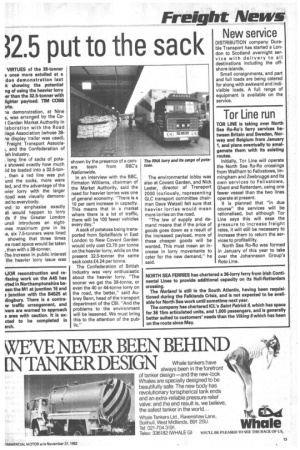32.5 put to the sac
Page 9

If you've noticed an error in this article please click here to report it so we can fix it.
VIRTUES of the 38-tonner a once more extolled at a don demonstration last !k showing the potential ng of using the heavier lorry ler than the 32.5-tonner with lighter payload. TIM COBB 3rts.
le demonstration, at Nine s, was arranged by the Cot Garden Market Authority in laboration with the Road ilage Association (whose 38ne display trailer was used), Freight Transport Associa1, and the Confederation of ish Industry.
long line of sacks of potas showed exactly how much lid be loaded into a 32.5-ton, then a red line was put und the sacks, more were led, and the advantage of the ivier lorry with the larger (load was visually demons:ed to everybody.
knd to emphasise exactly at would happen to lorry ds if the Greater London uncil introduces an eightInes maximum gvw in its pa, six 7.5-tanners were lined showing that three times )re road space would be taken , than with a 38-tonner.
fhe increase in public interest the heavier lorry issue was shown by the presence of a camera team from BBC's Nationwide.
In an interview with the BBC, Firmston Williams, chairman of the Market Authority, said the need for heavier lorries was one of general economy. "There is a 10 per cent increase in capacity. This means that in a market where there is a lot of traffic, there will be 100 fewer vehicles every day."
A sack of potatoes being transported from Spitalfields in East London to New Covent Garden would only cost £3.79 per tonne on the heavier lorry, while on the present 32.5-tonner the same sack costs £4.24 per tonne.
The Confederation of British Industry was very enthusiastic about the heavier lorry. "The sooner we get the 38-tonne, or even the 40 or 44-tonne lorry on the road, the better," said Aubrey Benn, head of the transport department of the CBI. "And the problems to the environment will be lessened. We must bring this to the attention of the public." The environmental lobby was also at Covent Garden, and Nick Lester, director of Transport 2000 (curiously, representing GLC transport committee chairman Dave Wetzel) felt sure that heavier lorries would mean more lorries on the road.
"The law of supply and demand means that if the price of goods goes down as a result of the increased payload, more of these cheaper goods will be wanted. This must mean an increase in lorry movements to cater for the new demand," he said.


















































